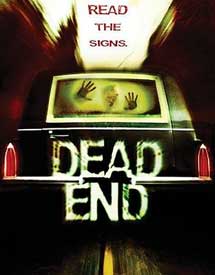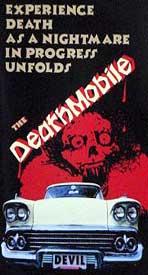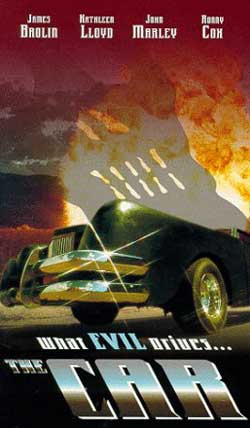 A father (Ray Wise, who played Leland in Twin Peaks) is driving his family to the in-laws for Christmas when they find themselves lost on a back road, with a driverless car in demonic pursuit. A father (Ray Wise, who played Leland in Twin Peaks) is driving his family to the in-laws for Christmas when they find themselves lost on a back road, with a driverless car in demonic pursuit.
It is sometimes charming when films are this cheap, but this one didn't charm me personally. The primary set for Dead End (2003) is inside the car driving along a dark road. It dishes up an hour & a half of monotony punctuated at intervals with off-screen violence & death that has no rationality.
The cryptic ending implies "it was all a dream" making a cheap film also a cheap shot.
Despite an actor of Ray Wise's merits & a supporting cast that keeps up with him, the film is simply stultifying. But the theme of the demonic car is potentially a lot better than this, & Dead End reminded me of a film I saw many years ago that did it well:
 I told some chums to watch The Car & assured them it was a fine wee film, but after they watched it, they told me "you sure like some dumb stuff paghat." But I persist in being impressed. I thought the "story" was good enough it might make a good book. There was in fact a movie tie-in paperback (by Dennis Shryack from the script he co-wrote with Michael Butler). I bought it & sat down to read it. Pee-yoo the novelization stank, even though it was indeed the exact same story. I told some chums to watch The Car & assured them it was a fine wee film, but after they watched it, they told me "you sure like some dumb stuff paghat." But I persist in being impressed. I thought the "story" was good enough it might make a good book. There was in fact a movie tie-in paperback (by Dennis Shryack from the script he co-wrote with Michael Butler). I bought it & sat down to read it. Pee-yoo the novelization stank, even though it was indeed the exact same story.
But as a film I still think it was very successful & it surprises me it isn't mentioned by horror fans more often. This black car (a thoroughly modified Lincoln Mark III) with amber tinted windows & wide scowly grill wanders the back roads & main highways seeking out & killing victims. In one sequence it even leaps straight through a living room plate-glass windows & out through the back wall of the opposite side of the house, merely to take out its chosen victim, as there is no safety from the thing, even if one stays off the roads in their locked homes.
Another scene that had me on the edge of my seat was when the black car stopped beside an intended victim sprawling on the side of the road, & opens its driver door tempting the victim to peak inside to find out if there is a satanic driver or not.
The sheriff (James Brolin) does come to realize the car itself is demonic & will require unusual efforts to send it back to hell. In its pacing, in its atmospheric photography of the demonic vehicle, this is an ideal low budget horror fiom that did not rely on the sleeze factor to be effective. It truly conveys how in our modern world, if demons were real, they would not be leathery-winged pointy-tailed fallen angels of medieval imagination, but they would be demons of our own machine age. And cars are already killing more people than war.
The Car was temporarily retitled shlockilly Deathmobile in an early video release (with entirely the wrong car depicted on the box). On DVD it has its original title restored. It remains one of the best evil car movies ever, a leaner story than Christine (1983) but worthy of a double bill beside it -- a double-bill I wish could be presented in one of the few lingering old-fashioned Drive-in theaters attended by the members of our local vintage auto clubs.
 I don't think there's any chance that Stephen King hadn't seen The Car & borrowed from it for his novel Christine, though in telling the story of her two owners, he created an original work of fiction with cinematic influence, not a plagiarism. The movie version develops mainly the story of Christine's second & last owner. I don't think there's any chance that Stephen King hadn't seen The Car & borrowed from it for his novel Christine, though in telling the story of her two owners, he created an original work of fiction with cinematic influence, not a plagiarism. The movie version develops mainly the story of Christine's second & last owner.
She is a 1958 Plymouth Fury who was just built b-b-bad to the bone, claiming her first victim while still on the assembly line. By the time she is discovered by high schooler Arnie (Keith Gordon), Christine is an old junker. She mesmerizes him; it is love at first sight, probably mutual, for even the devil can love.
Arnie's blood & soul restore Christine to her fresh-off-the-assembly-line sleek beauty, while she in turn transforms an innocuous school nerd into a sexy 50s-style greaser with leather jacket & slicked back hair & psychotic personality.
Much of the appeal of Christine is how it is not all horror story, but in part a love story, a romance of the automobile as symbol of coolness & power & freedom. By comparison, The Car plays into a justified terror of a mechanized world destroying mere flesh & bone, with the automobile the symbol of coldhearted dehumanization in the machine age. Christine is more the temptation of saints, for it would be wonderful to have Christine as a best friend or lover, if only she weren't so evil.
A small warning, the 2004 special edition of Christine has a new soundtrack with the authentic golden oldies replaced by mediocre versions, probably because of copyright problems with the original artists though I don't know. The film's original soundtrack was just so perfect for a '58 Plymouth from Hell. The horrific beauty of Christine's own radio providing the soundtrack from straight out of the past is undermined by this sorry alteration.
copyright © by Paghat the Ratgirl
|



